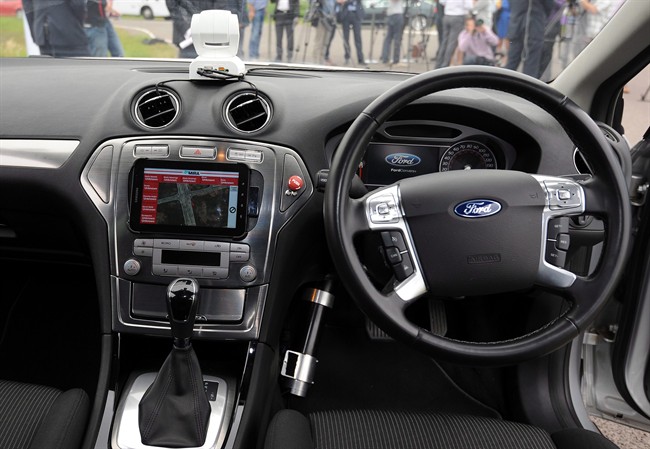The city of Edmonton is getting ready for the day when driverless cars and trucks dominate the streets. It’s coming sooner than you might think.

City council’s urban planning committee has heard that the planning department is working towards having a game plan ready for when the technology comes to Edmonton.
A consultant told the councillors that private interests are racing to be first. That way, they’ll make a fortune leaving every one else behind.
The information left Coun. Andrew Knack admittedly wondering if it will be worth it to invest billions in expanding the LRT.
“It’s a question I continue to struggle with. Is this five-year-from-now technology?” he told 630 CHED’s Scott Johnston. “Could it potentially render mass transit obsolete? There’s a possibility.”
READ MORE: Provincial transit funding shortfall ‘sideswipes’ infrastructure agenda: Edmonton mayor
“The private sector will have paid for almost everything of this,” said consultant Paul Godsmark, the chief technology officer for the Canadian Automated Vehicles Centre of Excellence.
“(Autonomous vehicles) will be reaching nearly 100 per cent of the population as opposed to taking it from the current ten per cent that is served by transit and LRT and taking it to 20 per cent.”

Get breaking National news
He said Ford, Tesla, Baidu, which is the Google equivalent in China, and Google itself are competing to have mass production ready with in the next five years.
“I believe it’s very, very close and when it’s rolled out it will be city by city,” Godsmark said.
“I can’t see it being rolled out by a few cars here and there. It’s in the interests of the people who make these vehicles to retain ownership and simply sell us a service of transportation.”
His expectation is the southern United States will be first, then the trend will move into Canada once it’s proven winter weather can be handled.
“We know that Google, Ford and Volvo are definitely doing some snow and winter-type testing,” Godsmark said. “I’ve seen that the technology is already there. It’s not cheap enough to be commercializable yet, but in the five-year time frame that we’re looking at, I think it’s almost certain that the technology will be available, it will be cost effective and it will be much better than human.”
READ MORE: Industry experts propose dedicated lane for driverless cars on highway linking Vancouver and Seattle
“We are exploring a low-speed pilot,” said Erin Toop, an engineer with urban planning for the city.
“It would have to be on private roadways because right now we are not able to operate automated vehicles on public roadways in Alberta.”
A proposal on that low-speed pilot will be before city council early next year.
Toop isn’t surprised that things are moving quickly.
“We are seeing examples of Level 4 automated shuttle buses being deployed in some cities in Europe so that does feel pretty tangible that there are examples where cities are pilot testing Level 4 automated shuttles,” she said.
READ MORE: ‘Don’t let idiots build your transit’: Reporter rips into Edmonton’s Metro LRT Line
Godsmark said driverless vehicles will also play a key roll in the movement of goods.
Pizza delivery is already happening that way, with what appears to be a cooler-on-wheels rolling along sidewalks.
“There are trials happening later this year and early next year in London, New York, San Francisco,” Godsmark said. “There’s a company called Starship, there’s a company called Dispatch. Dominoes Pizza are looking at doing trials in Wellington in New Zealand with this form of delivery.”

Comments